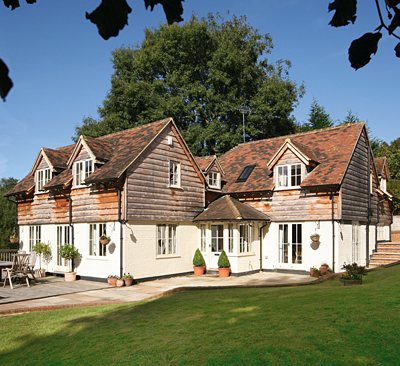Top tips for downsizing
Arabella Youens gathers some top tips for those thinking of downsizing this year or next


Downsizing is the fourth ‘D' that everyone forgets when they talk about death, debt and divorce as market motivators, says Richard Gayner of Savills' country department.
According to their research team, downsizers account for more than a fifth of sellers in the prime sector, and their reluctance to move in a downward market has been instrumental in limiting the number of houses launched on the market this year. Those who did make the move achieved an average sale price of £993,800 and downsized to properties worth, on average, £611,700, according to figures from Lucian Cook, director of research.
There's no consensus about a ceiling age that should signal the time to downsize it's more a case of how the house and garden are holding up. ‘If the garden's become overrun because it's got too much, it's harder to sell,' says Martin Lamb of Savills in Exeter. Richard Brooks of Strutt & Parker's country-house department is sterner: ‘Don't under-estimate the task in hand and do it when you're still energetic and young enough not when one of you is having a new hip fitted!'
Preparations for downsizing should start as early as possible plan for the year ahead to take advantage of a whole year's selling season. The first bit of advice almost all agents give is to de-clutter. It's inevitable that the storage space in your new house will be reduced, so work on filing down the possessions should be an early priority.
‘Firstly, let your children know that there's a skip in the driveway that's ready to remove all their schoolwork masterpieces, unless they come and fetch them,' advises Bruce Tolmie-Thomson of Knight Frank's country department. ‘Then, it's time to put a call through to Sotheby's, Christie's or, depending on the quality of the furniture, the local auction house to see whether some of the bigger items that won't fit in a smaller house can be sold.' Grand pianos, dining tables and chairs are among some of the most likely victims of the furniture cull if they can't be passed on to the next generation.

* For more properties like this every week, subscribe and save
Next, get to grips with online auction sites and recycling shops. Never underestimate the power of eBay to find new homes for items that are surplus to requirement. Yes, it's slightly fiddly to start with, but selling items online is often a far more successful venture than opting for the more unpredictable barn sale. Not everything has to be packaged up, of course one man and his son drove from Yorkshire to pick up a farm gate that was surplus to requirements when my parents moved recently. That should deal with the good-quality items.
Sign up for the Country Life Newsletter
Exquisite houses, the beauty of Nature, and how to get the most from your life, straight to your inbox.
For well-worn bits of furniture, try organisations that redistribute it to underprivileged families, such as the Furniture Re-use Network (0117-954 3571; www.frn.org.uk). And there's also Freecycle (www.uk.freecycle.org), which, depending on the area, will find people who will take unwanted items away for free. Most downsizers will look for their new home to be in a village, not only to be close the shops, but also because it's more reassuring to have neighbours to keep an eye on the house during long trips overseas in January and February.
The other thing to bear in mind is to look for somewhere with enough bedrooms to accommodate the grandchildren when they come to stay. ‘But the garden is probably the most important consideration,' believes Strutt & Parker's Robin Thomas. ‘I'm currently selling three properties that have more than an acre of grass to cut, and this is one of the main reasons for selling and downsizing.'
However, don't be too fixated on finding somewhere with that idyllic third of an acre, as the work in a garden can be lessened by clever ground cover and flowering shrubs. ‘It's not easy, particularly in a slow market, to find a property that meets all these criteria. But don't forget, if you're sitting on a very tradeable asset, some buyers are prepared to allow for an extended completion date two years is not unheard of,' says Edward Sugden of buying agents Property Vision. ‘That gives the downsizers plenty of time to find their next house.'
-
 Six rural properties with space, charm and endless views, as seen in Country Life
Six rural properties with space, charm and endless views, as seen in Country LifeWe take a look at some of the best houses to come to the market via Country Life in the past week.
By Toby Keel Published
-
 Exploring the countryside is essential for our wellbeing, but Right to Roam is going backwards
Exploring the countryside is essential for our wellbeing, but Right to Roam is going backwardsCampaigners in England often point to Scotland as an example of how brilliantly Right to Roam works, but it's not all it's cracked up to be, says Patrick Galbraith.
By Patrick Galbraith Published
